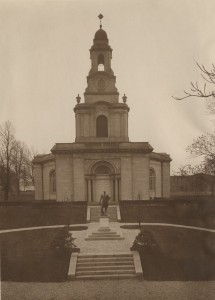College Tributes

At Lafayette College in October 1916, the war in France and the image of Lafayette were eloquently linked in a poem written by Maxwell McKeen, class of 1917, and read at the dedication of Colton Chapel. Lieutenant Maxwell McKeen sailed for France on July 7, 1918. He was mortally wounded near Verdun and died on November 9, 1918, two days before the Armistice was signed that ended the war.
In 1921, the great sculptor Daniel Chester French’s plaster model of the young Marquis de Lafayette was cast in bronze for Lafayette College as the gift of Morris W. Clothier. (The model was French’s study of Lafayette for a larger bas-relief monument in Brooklyn’s Prospect Park.) The new sculpture was installed in front of Colton Chapel and at the unveiling ceremony, H. MacKnight Black, class of 1916, read the poem he had been commissioned to write, “The Sword of Lafayette.” By the time of his untimely death in 1931, Black had become one of America’s most significant poets.
Lafayette—The Man and the College
By Maxwell McKeen, Class of 1917
Beloved of France, his country, and of ours,
For his great principles admired by all,
Winner of universal fame;
To him, brilliant hero, Freedom’s friend
Rescuer of our nation, a man whose thoughts
And deeds were ever for and with mankind,
We stand, a living monument.
When first our founders met in conclave here
With keen desire to meet an urgent need,
They gave us both a college and a name—
A precious heritage—to—guard.
The French supremely struggle to uphold
Liberty, Freedom, Justice for the world,
At cost of all they hold most dear,
These deeds of prowess and of sacrifice
Are but a following of his ideals
Who fought and risked his life for them and us,
A champion of humanity.
Thus France, in striving hard to win her fight,
Now waged to save the best there is in man,
Is stirred by thoughts of Lafayette, instilled
A century ago.
Our Alma Mater, dear to each and all,
May she her sons with noble impulse fill,
To lofty thoughts and noble deeds inspire,
As Lafayette his fellow men.
The Sword of Lafayette
by H. MacKnight Black, Class of 1916
So slender, strong and gay,
He came—
Not as a soldier comes,
Though in his heart was laughter
And no fear;
Not as a brother, to the call of blood,
Nor chevalier, who follows far
The shout of battle down the wind—
But as sheer Youth he came,
Ecstatic, clean and dauntless, sure,
Youth that forever, down all the days,
Turns its face eastward,
Hungry for dawn and restless of living,
Knowing a secret * * *
The dream cannot die.
So came young Lafayette—
For freedom’s life, in Youth’s bright name,
He drew his sword.
Then went there back, a million-fold,
Firm grasped in eager hands—
The Sword of Lafayette.
These threw their bodies, like worn cloaks,
Into the flame,
And smiling, flashed the steel of youth
In high, red onslaught of the brave;
For in their hearts they held
The secret and the dream, inviolate—
Hungry for dawn, they leapt
And tore a midnight from the sky;
And through the break they made
There shone a moment on the old, grey world
The gleam that fell on Calvary.
So went there back,
For freedom’s life, in Youth’s bright name,
The Sword of Lafayette.
And now that sword is passed
To other hands. Now lips may kiss
Its shining steel, in pledge
Of Youth’s own mysteries;
To learn, to think, to run with winds,
To find old truth, new friends and all
The inborn ecstasy of life that falls
With evening quiet, on college walls—
Alive to little things, content and peace,
Yet stirred by all the splendid quests
That urge and call the heart of gallant youth—
To turn, face eastward, toward the dawn
Where passed that golden host
Of boys of other days;
Know agony and vision, hope and high romance,
And learn at last the secret * * *
Intimate as heart-beat * *
The dream that cannot die.
From age to age, in Youth’s bright name
The Sword of Lafayette.
